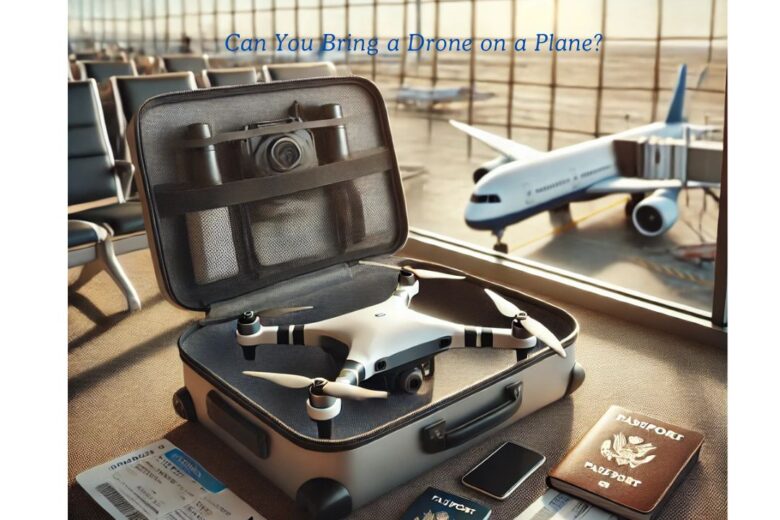Making plans to fly a drone can raise a lot of questions. You could fit it in your suitcase. And what about the batteries? And do you have to obey particular airline policies? A good vacation depends on knowing the answers, particularly if you’re eager to record spectacular aerial videos at your location. From laws to packing advice, here is all you need to know about flying a drone. Planning to travel with a drone can bring up a lot of questions. Can You Bring a Drone on a Plane? What about the batteries? Are there specific airline rules you need to follow? Knowing the answers is essential for a smooth trip, especially if you’re excited to capture amazing aerial footage at your destination. Here’s everything you need to know about bringing a drone on a plane, from regulations to packing tips.
Are Drones Allowed on Planes?
Although most of them are let on aircraft, it’s crucial to know where and how to carry drones. Since the Transportation Security Agency (TSA) of the United States has set specific criteria for letting drones pass airport security, most airlines adhere to the same policies. Although most of the time drones can be carried in carry-on bags, safety concerns—especially about the batteries—may prohibit checked baggage.
Carry-On vs. Checked Baggage for Drones
Generally speaking, the best option for your drone is to pack it in your carry-on rather than checked bags. This is mostly due to airlines like these being in the cabin for safety reasons and lithium-ion batteries, which most drones run, can be volatile under specific situations. Carry-on storage also reduces the possibility of damage during travel since checked baggage can be treated roughly.
Battery Regulations for Drones
Drone functioning depends on lithium batteries, which also come with particular rules for air flight. Most airlines and TSA rules allow carry-on baggage including lithium-ion batteries up to 100 watt-hours. Should the batteries of your drone surpass this limit, you might require airline permission, and some batteries could be absolutely forbidden.
What Type of Drone Batteries Are Allowed?
It matters the kind of battery used. The most often used batteries in drones are lithium-ion and lithium-metal ones; both have specific rules. Mostly:
Lithium-Ion Batteries: Allowed up to 100 watt-hours without limit; over 100 watt-hours calls for airline approval.
Lithium-Metal Batteries: Restricted dependent on quantity and watt-hour batteries are lithium-metal batteries.
To prevent last-minute problems at security, always ask ahead of time your airline.
How Should One Pack a Drone for Travel?
Mostly depending on good packing, keeping your drone safe during your trip is Here are some rules:
Use a strong, padded case to protect the drone from crashes.
Remove propellers wherever damage can be stopped most easily.
Separately pack batteries in a fireproof bag using safety guidelines.
This guarantees your drone shows up whole and ready for takeoff.
International Drone Travel Considerations
Remember that your trip abroad status will greatly affect the drone rules. Certain nations have strong regulations on the usage of drones; hence transporting a drone into such a nation could need particular licenses. Find the local rules at your house to avoid any legal problems or possible fines before you leave.
Specific Airline Policies for Drones
Every airline has particular rules on flying drones. For example:
American Airlines: American Airlines lets drones carry on but limits big lithium batteries in checked baggage.
Delta: Emphasising carry-on storage, Delta is like American Airlines.
Ryanair and EasyJet: Ryanair and EasyJet have tougher rules and might call for prior permission for drones running bigger batteries.
The best approach to guarantee compliance and prevent delays is ahead of time checking with your airline.
Drone Registration Requirements
Sometimes you might have to register your drone before flying, particularly if it weighs more than a specified limit—often 250 grams. For instance, the Federal Aviation Administration (FAA) mandates that drones licensed for specific purposes be U.S.-based. Make sure that your drone’s registration complies with both national regulations in your country and those of the destination and is current.
Insurance for Traveling with Drones
Should an accident or unanticipated problem arise, drone insurance can literally save lives. You can choose specialist drone insurance or certain travel insurance policies cover drones. Usually, covers cover against damage, theft, or liability while flying the drone overseas.
Can You Fly Your Drone to Your Destination?
Just because you can bring a drone to your destination doesn’t mean you’re allowed to fly it there. Many countries have strict regulations governing where and when drones can be flown, and you might need a permit or license. National parks, airports, and military areas are often no-fly zones, so familiarize yourself with these restrictions in advance.
What Happens if You Don’t Follow the Rules?
Ignoring airline or national-specific rules could cause your drone to be seized and result in fines or other consequences. In some severe situations, breaking rules regarding drone use or air transport could result in legal action. Following the guidelines and being knowledgeable will help you avoid many problems.
Safety Advice for Drone Travel
These ideas will help you to travel with your drone as seamlessly as possible:
- Advanced knowledge of airline policies helps one to prevent airport shocks.
- Correctly secure batteries to avoid failures or fires.
- Arrange your drone and accessories in a dedicated case.
- Find out the drone rules at your destination to prevent legal problems.
Final Thought
Science has invented many valuable technologies and drone is one of them. Sometimes it’s necessary to bring a drone on a plane. Although you are usually free to bring a drone on a plane, you should be aware of local drone legislation at your destination as well as airline rules on batteries. Following these rules, packing wisely, and getting ready ahead of time will help you to guarantee a hassle-free vacation with a drone.
Frequently Asked Questions (FAQs)
Can I bring a drone on any airline?
Yes, most airlines allow drones, but each has specific guidelines. Always check your airline’s policy.
Are drone batteries allowed in checked baggage?
Typically, no. Most airlines require drone batteries to be carried in the cabin for safety reasons.
Do I need a permit to fly my drone at my destination?
It depends on the destination. Some countries require permits, while others have restricted areas where drones can’t be flown.
What happens if my drone exceeds the battery-watt-hour limit?
You may need airline approval or could be restricted from bringing it. Check with your airline for details.
Can my drone be confiscated at security?
Yes, if you don’t follow TSA or airline guidelines, security can confiscate or restrict your drone.






Really very helpful post. Loved this post. Clear, concise and useful. I will follow this instruction while bring drone on plane.
Excellent tips! Very useful and well-explained article for drone lovers like me